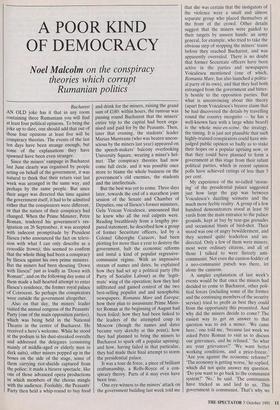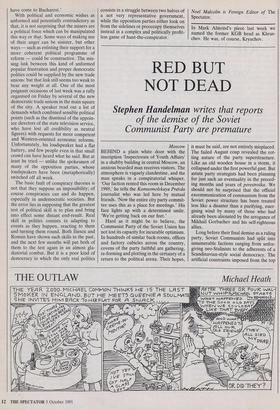A POOR KIND OF DEMOCRACY
Noel Malcolm on the conspiracy theories which corrupt Rumanian politics
Bucharest AN OLD joke has it that in any room containing three Rumanians you will find at least four political opinions. To bring the joke up to date, one should add that out of those four opinions at least five will be conspiracy theories. The events of the last ten days have been strange enough, but some of the explanations they have spawned have been even stranger.
Since the miners' rampage in Bucharest last June clearly was organised by people acting on behalf of the government, it was natural to think that their return visit last week was arranged in the same way, and perhaps by the same people. But since their anger was directed this time against the government itself, it had to be admitted either that the conspirators were different, or that the nature of their conspiracy had changed. When the Prime Minister, Petre Roman, tendered his government's res- ignation on 26 September, it was accepted with indecent promptitude by President Iliescu (who announced the fact on televi- sion with what I can only describe as a crocodile frown); this seemed to confirm that the whole thing had been a conspiracy by Iliescu against his own prime minister. But the miners had been shouting 'Down with Iliescu!' just as loudly as 'Down with Roman!', and on the following day some of them made a half-hearted attempt to enter Iliescu's residence, the former royal palace of Cotroceni. So perhaps the conspirators were outside the government altogether.
Also on that day, the miners' leader visited the annual congress of the Peasants' Party (one of the main opposition parties), which was being held in the National Theatre in the centre of Bucharest. He received a hero's welcome. While he stood at the podium in his dust-streaked overalls and addressed the delegates (consisting mainly of middle-aged or elderly men in dark suits), other miners popped up in the boxes on the side of the stage, some of them carrying riot-shields captured from the police: it made a bizarre spectacle, like one of those advanced opera productions in which members of the chorus mingle with the audience. Foolishly, the Peasants' Party then held a whip-round to buy food and drink for the miners, raising the grand sum of £180: within hours, the rumour was passing round Bucharest that the miners' entire trip to the capital had been orga- nised and paid for by the Peasants. Then, later that evening, the students' leader Marian Munteanu (who was beaten uncon- scious by the miners last year) appeared on the speech-makers' balcony overlooking University Square, wearing a miner's hel- met. The conspiracy theories had now come full circle, and it was possible once more to blame the whole business on the government's old enemies, the students and the intellectuals.
But the best was yet to come. Three days later, towards the end of a marathon joint session of the Senate and Chamber of Deputies, one of Iliescu's former ministers, Gelu Voican Voiculescu, announced that he knew who all the real culprits were. Reading breathlessly from a lengthy pre- pared statement, he described how a group of former Securitate officers, led by a Colonel Gheorghe Cazacov, had been plotting for more than a year to destroy the government, halt the economic reforms and instal a kind of populist regressive- communist regime. With an impressive stream of names and dates, he explained how they had set up a political party (the Party of Socialist Labour) as the 'legiti- mate' wing of the operation; how they had infiltrated and gained control of the two best-selling populist and and xenophobic newspapers, Romania Mare and Europa; how their plan to assassinate Prime Minis- ter Roman at the beginning of August had been foiled; how they had been linked to the leaders of the attempted coup in Moscow (though the names and dates became very sketchy at this point); how they had planned to bring the miners to Bucharest to spark off a popular uprising; and how, having failed in that particular, they had made their final attempt to storm the presidential palace.
It was a tour de force, a piece of brilliant craftsmanship, a Rolls-Royce of a con- spiracy theory. Parts of it may even have been true.
One eye-witness to the miners' attack on the government building last week told me that she was certain that the instigators of the violence were a small and almost separate group who placed themselves at the front of the crowd. Other details suggest that the miners were guided to their targets by unseen hands: an army general, for example, who tried to take the obvious step of stopping the miners' trains before they reached Bucharest, and was apparently overruled. There is no doubt that former Securitate officers have been active in the parties and newspapers Voiculescu mentioned (one of which, Romania Mare, has also launched a politic- al party of its own), and that they feel both estranged from the government and bitter- ly hostile to the opposition parties. But what is unconvincing about this theory (apart from Voiculescu's bizarre claim that he had discovered the details by travelling round the country incognito — he has a well-known face with a large white beard) is the whole mise-en-scene, the strategy, the timing. It is just not plausible that such highly-trained conspirators could have mis- judged public opinion so badly as to stake their hopes on a popular uprising now, or that they could have planned to form a government at this stage from their infant political parties, which in recent opinion polls have achieved ratings of less than 5 per cent.
My experience of the so-called 'storm- ing' of the presidential palace suggested just how large the gap was between Voiculescu's dazzling scenario and the much more feeble reality. A group of a few hundred demonstrators stood at least 50 yards from the main entrance to the palace grounds, kept at bay by tear-gas grenades and occasional blasts of bird-shot. Their mood was one of angry bewilderment, and they seemed quite leaderless and un- directed. Only a few of them were miners; most were ordinary citizens, and all of those I talked to were fiercely anti- communist. Not even the cannon-fodder of a neo-communist putsch was there, let alone the cannons.
A simpler explanation of last week's events would be that once the miners had decided to come to Bucharest, other poli- tical forces (including some of the former and the continuing members of the security service) tried to profit as best they could from the opportunity this presented. And why did the miners decide to come? The easiest way to get an answer to that question was to ask a miner. 'We came here,' one told me, 'because last week we asked Petre Roman to visit us to discuss our grievances, and he refused.' So what are your grievances?' We want better working conditions, and a price-freeze.' 'Are you against the economic reforms?' 'The economy is getting worse,' he replied, which did not quite answer my question. 'Do you want to go back to the communist system?' No,' he said. 'The communists have tricked us and lied to us. This government is communist. That's why we have come to Bucharest.'
With political and economic wishes as unformed and potentially contradictory as that, it is not surprising that the miners are a political force which can be manipulated this way or that. Some ways of making use of their anger can be sinister, but other ways — such as enlisting their support for a more coherent political programme of reform — could be constructive. The mis- sing link between this kind of unformed popular frustration and proper democratic politics could be supplied by the new trade unions: but that link still seems too weak to bear any weight at all. One of the most poignant occasions of last week was a rally organised on Friday by several of the new democratic trade unions in the main square of the city. A speaker read out a list of demands which combined sensible political points (such as the dismissal of the appoin- tee directors of the state television service, who have lost all credibility as neutral figures) with requests for more competent and Western-oriented economic reforms. Unfortunately, his loudspeaker had a flat battery, and few people even in that small crowd can have heard what he said. But at least he tried — unlike the spokesmen of many of the opposition parties, whose loudspeakers have been (metaphorically) switched off all week.
The basic fault of conspiracy theories is not that they suppose an impossibility; of course conspiracies can and do happen, especially in undemocratic societies. But the error lies in supposing that the greatest test of political skill is to plan and bring into effect some distant end-result. Real skill in politics consists in adapting to events as they happen, reacting to them and turning them round. Both Iliescu and Roman have shown such skills in the past, and the next few months will put both of them to the test again in an almost gla- diatorial combat. But it is a poor kind of democracy in which the only real politics consists in a struggle between two halves of a not very representative government, while the opposition parties either look on from the sidelines or preoccupy themselves instead in a complex and politically profit- less game of hunt-the-conspirator.
Noel Malcolm is Foreign Editor of The Spectator.



















































 Previous page
Previous page